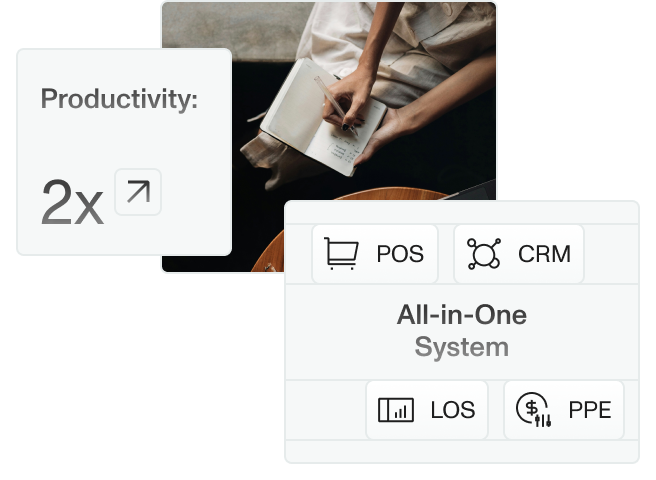The mortgage underwriting process is the stage in the loan approval process where a borrower’s financial stability and eligibility are assessed.
If you’re a loan originator or own a loan origination company, a keen understanding of this process is important. Your customers will expect you to efficiently guide them through the mortgage journey. Your challenge will be balancing all the paperwork associated with this process and helping advise on risk mitigation, compliance, and matching clients with appropriate loan products.
Why Mortgage Loan Underwriting is Essential
The underwriting criteria for loans have become a critical safeguard in the lending process. They mitigate lenders’ risk by thoroughly and thoughtfully assessing the borrower’s ability to take on a loan. Without a thorough mortgage underwriting process, lenders would face higher default rates, potentially putting their business at risk.
The mortgage underwriting process generally involves assessing borrower eligibility based on factors such as:
- Credit history
- Income
- Debt levels.
Regulatory requirements help set the parameters by which a lender can work with a borrower. By the same token, each borrower’s financial situation must be honest and transparent, as required by laws such as the Real Estate Settlement Procedures Act (RESPA) and the Truth in Lending Act (TILA).
These regulations ensure transparency and fairness for the lender and the borrower; the mortgage underwriting process is vital in fulfilling them.
Critical Steps in Mortgage Underwriting
A standard mortgage loan underwriting process is broken up into three distinct stages:
- Application Review: Paperwork includes reviewing income, assets, and debt documentation.
- Credit Score and History: Credit scores offer a snapshot of the borrower’s financial habits, giving underwriters insight into how likely they are to repay the loan.
- Income Verification: Verification can involve pay stubs, tax returns, or other proof of income to ensure the borrower can handle the repayment schedule.
Factors Influencing Underwriting Decisions
Certain factors are considered by mortgage loan officers during each of the three steps listed above. These factors are the key ingredients for a successful mortgage underwriting process.
- Debt-to-Income (DTI) Ratio: Calculating total monthly debt payments by gross monthly income. A low DTI ratio indicates a borrower is more likely to repay the loan without strain.
- Loan-to-Value (LTV) Ratio: The LTV ratio compares the loan amount to the appraised property value. A higher LTV ratio poses a greater risk to lenders, implying less borrower equity.
- Credit History: Borrowers with a strong credit history are more likely to receive favorable underwriting outcomes. This directly reflects creditworthiness and impacts interest rates, loan terms, and approval status.
Best Practices for Successful Underwriting
Being professional and direct with your clients is the best way to create a win-win for you and your customers. After all, you run a business, and they want to buy a home, so it’s in everyone’s best interest to have open communication. Here are a few options and pieces of advice to provide to clients you’re working with:
- Comprehensive Loan Application Packages: Ensure that the applicant submits all required documentation quickly. This will reduce delays and minimize back-and-forth with underwriters.
- Set Expectations: Don’t sell false realities. Setting clear and realistic expectations early helps borrowers understand what they need to provide to avoid delays.
- Addressing Challenges: Underwriting challenges can arise, especially with complex financial situations. Proactively and quickly resolving issues can make the overall mortgage underwriting process easier.
Technology and Tools in Mortgage Underwriting
The mortgage industry relies heavily on technology to streamline the mortgage underwriting process. Systems like Sonar improve efficiency by quickly analyzing borrower data and integrating LOS, POS, and PPE capabilities. Some benefits of using technology in underwriting include:
- Data-Driven Decisions: We live in the era of having access to vast amounts of borrower data, making it easier for underwriters to make informed, accurate decisions.
- Efficiency Tools: The right tools, like automated verification systems for income and assets, can augment the underwriting process.
The mortgage underwriting process is essential to safe lending. Loan originators knowledgeable in underwriting practices will be better equipped to guide clients through the mortgage process, promising smooth transactions and fewer risks. Loan underwriters who adhere to best practices, leverage technology, and stay compliant with regulations can enhance their business efficiency and client satisfaction.
Ready to take your mortgage underwriting to the next level? See how Sonar’s tech is leading the charge of the mortgage industry’s tech revolution. Request a demo today.







